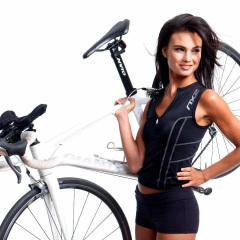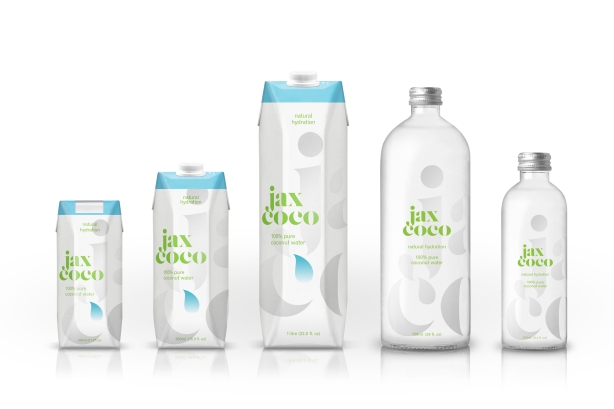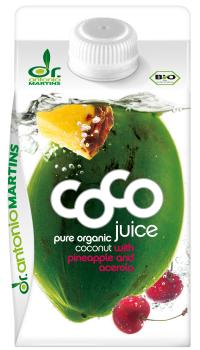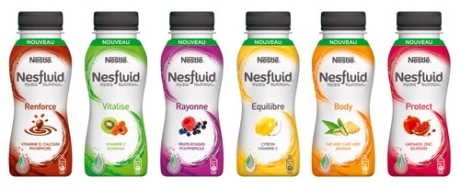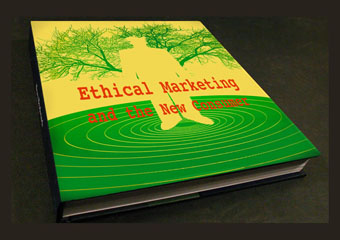THE EXPANDING COCONUT WATER MARKET
A Creative Orchestra (Advertising & Brand Marketing) report. (www.creativeorchestra.com)
Researched and written by Caryn Coley & Chris Arnold with additional material from Vita Coco.
We’re all aware of the sentiment behind ‘you are what you eat’ but increasingly consumers are concerned with the concept of ‘you are what you drink’.
With a growing awareness of health issues most of us are thinking twice about what we put into our bodies, be it food or drink, and that’s now big business.
Coconut water is one of the fastest growing beverage categories in the US and UK (estimated to reach $1bn soon) due to its natural hydrating qualities, great taste and nutritional benefits, not to mention the large number of celebrities drinking it. It is a great source of nutrients, contains calcium and magnesium, and the same amount of heart healthy potassium as a banana or a glass of orange juice. And that’s just a few of its ‘superdrink’ claims. With a mass appeal to ethical and health conscious consumers and those leading an activity lifestyle, and some are predicting it could overtake the sales of orange juice (as has already happened in Brazil) it’s no wonder big brands like Pepsi & Coke are getting in on the act.
There are now 250 companies that have a beverage with some form of coconut water in it.
The UK coconut water category has exploded in the last few years and is widely being tipped as the next big thing in the drinks category and estimated to be worth £100m by 2014 [The Grocer July ’11] and is already worth over $350 in the US.
According to a 2012 report by New Nutrition Business the number of coconut water beverage launches in Europe quintupled from 2009 to 2011, ballooning from seven to 36 brands. Retail sales grew 100 percent in 2011 and the current value of the European market is estimated to be worth $65 million. (The report values the U.S. coconut water market in 2011 as ranging between $110 and $200 million.)
There are now over 20 brands in the UK market (see chart at end), many small but also some significant players too.
The leading brand in the UK (and world) is Vita Coco, launched here in 2010, with sales of £8.5m in 2011 and 96% of the market. Sales between 2011-2012 have risen by 168%, and are rising still. It’s stocked in most supermarkets and health food shops.
Vita Coco is the market leader (in US and UK) and was originally founded in the US (it sources coconut water from Brazil and Asia). It is credited with creating the market (in the same fashion as what Red Bull did for energy drinks, Snapple for cold tea and Innocent did for smoothies).
The recent explosion of the coconut water category can be explained relatively simply; it meets growing consumer demands for natural, healthy products. There is a growing awareness of health & fitness issues, even though obesity is on the rise across Europe and the US – it is estimated that 45% of men and 33% of women in the UK will be obese within the next few years.
While some people manage their weight, others “offset”. Offsetting is really a token gesture, even if swapping a full fat coke for a low calorie one is a step forward, it’ll take more than a can of coconut water a day to stay healthy.
Back in 2010, there were only a handful of coconut water brands gracing the shelves of specialist food stores, but by 2012 there are over 20 coconut water brands in the market, all vying for space within this rapidly growing and seemingly lucrative category. In terms of scalability, the coconut water market is huge.
‘We’re seeing compelling data across all channels demonstrating the mainstream appeal of Vita Coco. In natural & health specialists, Vita Coco is their No.1 packaged drink of any non-alcoholic drinks including any water or cola brand. One of the leading supermarkets where Vita Coco 330ml pure is national distributed in all stores, Vita Coco, whether absolute revenue, units, unit or value rate of sale, is the No.2 branded Impulse line in chilled Juice & Smoothies, ahead of all other branded line apart from Tropicana orange Juice 330ml (last year for 7 weeks was ahead of Tropicana orange juice 330ml!). 1 litre is enjoying equal success and we’ve just seen two major supermarkets extend us from 200 stores to over 650 stores.’ said Vita Coco Europe chief executive Giles Brook.
With leading retailers such as Waitrose and Tesco clamouring to stock coconut water, the market is set to expand. The real battle though will be between the brands for market share.
Background
Whilst it’s entirely plausible to think of coconut water and its inherent health benefits as recent discoveries, the reality points to a much more established history. For the Western world, dating as far back as WWII, coconut water was widely used for emergency plasma transfusions.
However, coconut water has long been a staple for people in the Tropics as a fresh and accessible source of hydration. For places like Southeast Asia, the South Pacific, the Caribbean and South America (Brazil is one of the main suppliers), coconut water provides a sweet tasting and readily available alternative to water or sugary soft drinks and juices. The taste can vary due to its source.
Harvested from the young green coconut, the extracted water is clear with a light flavour, unlike coconut milk which is squeezed from the white pulp and is full of fat.
The coconut tree has often been referred to in some cultures as the ‘Tree of Life’, due to its versatility; as each element of the tree can be used in some facet; whether it is the oil extracted from the coconut acting as a natural skin and hair moisturiser to being a great source of potassium, higher than that of the banana.
And now it is rapidly becoming a favourite go-to drink for athletes, nutritionists and celebrities the world over as a healthy alternative to glucose based sports and energy drinks. Athletes and fitness fanatics are swopping to coconut water for its high potassium and mineral content and the promise of fast, natural hydration. Even though many of the benefits of coconut water or many sports drinks are insignificant unless undertaking a lot of exercise, health conscious individuals are looking for a tasty alternative to water that has no preservatives, no fat, no cholesterol and fewer calories than your average flavoured waters, fruit juices or smoothies.
A key element that has contributed to the rise in coconut water’s popularity is due to its perceived health benefits and it being segmented in the ‘superfoods’ category. By tagging certain food as superfoods, their marketability (and in turn profitability) can often increase tenfold.
Superfoods (or superdrinks) are described as foods (or drinks) containing a variety of high-level essential nutrients and other important elements like Omega 3. Essential nutrients are nutrients we need but cannot produce ourselves. Superfoods provide detoxifying agents and act as a great food supplement in accordance with a healthy diet. What is important to note is that outside of the EU the term ‘superfood’ is unregulated, however, inside the EU a ‘superfood’ such as coconut water, must be proven to at least meet one specific health claim.
(Pic of Amanda Russell, ZICO’s new signing)
Some of the claimed benefits include:
• High in potassium (more than bananas) – may help prevent strokes, heart attacks, dehydration and hangovers.
• Aids slimming, the high levels of potassium reduces fluid retention.
• Low calorie, low in fats and carbohydrates.
• Contains antioxidants (which can help prevent cancers and heart disease)
• Can help carry nutrients and oxygen to cells.
• Helps raise your metabolism.
• Boosts the immune system and reduces heartburn.
• Cleanses the digestive tract (also a laxative if drunk a lot).
• Can help to control diabetes.
• Treats kidney and urethral stones.
• Aids the body in fighting off virus’ that can cause flu, herpes and AIDs.
• Can help prevent cellulite.
• Coconut water also contains compounds that seem to protect cells against aging and cancer.
• Contains more electrolytes (potassium, magnesium, calcium, sodium and phosphorous) than most sports drinks (it contains the same five electrolytes found in human blood).
• Contains high levels of lauric acid (present in mother’s milk), which the body uses to make monolaurin, a disease-fighting fatty acid derivative. Lauric acid has anti-fungal, antibacterial and antiviral properties that protect the body against various infections and boost the immune system.
• Lowers blood pressure and boosts circulation.
Though impressive, the majority of these health claims have not yet been proven, so the extent to which the claims have been featured in advertising or marketing is very small, with most companies shying away from the more ‘outlandish’ claims, in favour of highlighting its hydration benefits and natural goodness. In the US there has been a small backlash against some of the claims but little if no effect upon sales. Theses health claims are often secondary as most brands are using celebrity endorsement, also, regulations on health claims restricts many brands featuring them in ads or on packaging.
Its high potassium content is a key element in many of the claims as is improved hydration – both of which can be substantiated.
For these reasons coconut water can be categorised in terms of hydration, nutrition and functionality; some consumers may choose the hydration benefits of water but with a more enhanced or different taste profile.
Others may opt for the nutritional benefits of chilled juice or smoothies but they don’t want the calories or sugar. And then there are those who prefer the functionality normally associated with a sports drink but don’t want the artificial or synthetic experience found with existing sports drinks.
A study of post-exercise rehydration carried out by the Universiti Sains Malaysia compared coconut water, sports drinks and normal water. It found coconut water was ‘significantly sweeter, caused less nausea, fullness and no stomach upset’, concluding that it was the better option for thirsty athletes than sugary sports drinks.
The choice of the stars.
Nothing seems to get the public following a trend faster than celebrities adopting it. From fashion to food fads and diets, eco cars (like the Prius) to technology, a hungry press soon give the habits of the rich and famous extensive coverage and rockets products and brands into mass purchases.
Celebrities including Madonna, Teri Hatcher, Audrina Partridge, Courteney Cox, Rihanna, Jessica Simpson, Demi Moore, Chris Pine, Ed Westwick, Karolina Kurkova, Anna Lynne McCord, Lady GaGa, Stephen Moyer, Anna Paquin & Vampire Bill (Vampire Diaries) have all been spotted drinking coconut water (mainly Vita Coco) with the likes of Madonna (who invested into Vita Coco in the US). Not to mention many musicians, DJs, actors and sports stars.
There are however, five distinct key consumer groups, which are most likely to consume or purchase coconut water:
• Affluent, middle classed, health conscious Westerners who can afford to buy fresh, organic produce and superfoods.
• The energy drinks market; athletes who believe that coconut water can increase metabolism, rehydrate the body, replenish natural energy levels at a much faster rate as well as help prevent cramping after exercise.
• The health conscious who seek coconut water for its zero fat, low cholesterol and low calorie benefits and sweet taste.
• The ‘fad followers’; who will purchase coconut water because it’s ‘the in thing’, however that is not to say they are not a key cog in the consumer wheel but their interest is often fleeting and should not be overestimated. They see this product as a lifestyle choice and accessory.
• Traditionalists; people from the Tropics or those whose heritage originates from the Tropics. Coconut water is an everyday part of their diet, while they may be aware of some of the health benefits the coconut may or may not contain this is not their primary reason for consuming but is more of a by-product.
• Women are the main drinks, estimated to be up to 80%. 25-29 are the main age group.
The next stage – ethical claims
As if there are not enough health claims, some brands are now adding the ethical touch. ‘Organic’ and ‘Fairtrade’ coconut waters are the next spin. ‘Not from concentrate’ is also appearing, as some brands like Zico use concentrates. ‘No added sugar’, though few actually do, but nothing beats claiming purity. Packaging is also playing a part with various claims about recycling and sourcing of materials, though it’s uncertain if this really makes much of a difference to the majority of consumers (consumers pay a lot more lip service to ethics than actually acting on it). The leading brand that claims high ethics is O.N.E.
Flavourings
There has also been a growth in diversity of favourings with many brands now adding flavours such as lime, pineapple, mango, guava, pomegranate and even chocolate.
Soft drinks and health
With government pressure, directed at food & drink producers, retailers and the general public increasing, it is driving growth in healthy products across most food and drink areas.
The drinks industry is also facing another problem – rising sugar prices which are forcing many brands to look at the option of artificial sweeteners meanings, we are likely to see more ‘lite’ options in the marketplace.
Added health
As if it’s not a superdrink enough, GNC have launched PNENOM “with added vitamins & minerals”.
Trade
From a marketing point of view, the coconut cater industry is carving out a totally new category. Brands such as Vita Coco are trying to emulate what Redbull and Innocent have done for the sports and energy, juice and smoothies markets respectively, with a view to replicate their success.
Further to that, the three main players; Vita Coco, Zico and O.N.E have set up deals with major drinks brands or endorsements with well-known celebrities. Their affiliation with these brands coupled with the injection of capital and access to greater distribution channels have garnered rapid success for the coconut water category to date.
Functionality
Although the purchase of products like coconut waters are driven by emotional reasons, consumers will post rationalise and cite rational/functional reasons to justify their purchase.
Take Vitaminwater for instance, its success can be attributed to the pre-existing perceptions of water being a healthy beverage then coupling that with increased functionality through formulation, resulting in a best of both worlds type scenario, vitamins and water.
Marketing
Moving forward, the major players in the coconut water industry will need to concentrate on consolidating growth and defending their share of the market against other brands entering the market and own label brands.
Rockstar energy drinks has already launched a coconut water, it’s inevitable that other drinks brands will play off their brand strengths and do so too. Maybe Innocent next?
Now the market is established we will more than likely see a battle of the brands to own the biggest slice of the market. Big drink brands like Coca-Cola see it as a growth market so we can expect some big spends on TV. PR, celebrity endorsements and social media can only go so far but it is the might of TV that will secure brand dominance and retail confidence.
Celebrity endorsements from the likes of Madonna, Anthony Kiedis and Rihanna (above) have boughtVita Coco to the forefront of youth demographic. Both Madonna and Anthony Kiedis (Red Hot Chilli Peppers) are investors in the Vita Coco brand with Rihanna becoming the face and spokesperson in May 2011. A national marketing campaign ran across print, television, billboards and social media (Facebook) as well as being featured on Rihanna’s website.
“I grew up in Barbados – so when Vita Coco approached me to help develop a new flavour, I thought we should combine the natural coconut water with fresh tropical fruits – two of my favorite things,” says Rihanna. “It tastes so delicious and reminds me of home!”
While celebrities certainly help sell, not everyone is using film, TV and pop stars.
ZICO on the other hand is chasing the sports energy market and uses celebrity athletes heavily in its marketing and advertising, from NBA pro Kevin Garnett to wrestler Jacob Clark and US Paralympics wheelchair competitor Joshua George, Bryan Clay, reigning decathlon gold medalist and “World’s Greatest Athlete” title holder In the US. The NFL Players Association are also working in partnership with ZICO to give them status as ‘the official coconut water of professional football players’.
Their latest ‘glamour’ signing is runner Amanda Russell, who won ZICO’s ‘I am Natural’ campaign. Russell is also an AFTA Certified Trainer, has won triathlons and is creator of The AR Program, a holistic mind and body system that focuses on intense dynamic workouts and a healthy diet. She features in their advertising, having been packaged up to model level, and promotes workouts for ZICO online.
The ZICO website has an entire page dedicated to high profile athletes that drink ZICO before, during and after exercise. Their ‘No Lies’ print campaign also featured the faces of athletes with the tag line, ‘Don’t Swallow a lie’ covering their mouths which encouraged consumers to pick Zico’s natural sport drinks as opposed to lab made energy drinks. However, unlike almost all other coconut waters, ZICO is transported in a concentrated form and rehydrated before sale and even though this probably makes no difference to the product other brands have tried to use this against the brand.
This tone of advertising (in America) is similar to that of Vita Coco and Rihanna sentiments urging consumers to “Hydrate naturally from a tree, not a lab,” which was seen as poke at PepsiCo’s Gaterade (Pepsi bought Amacoco in 2009, Brazil’s largest coconut water brand) and Coke’s Powerade (ironic considering Coca-Cola has an interest in ZICO).
Foundations – top three brands in US (Vita Coco, ZICO & O.N.E.).
Vita Coco (vita is latin for life) was founded in 2004 by Michael Kirban (just 29) and his old school friend Ira Liran (who married a Brazilian girl). Within 3 years sales had hit over $4m in the US. Kirban says he was inspired by two Brazilian girls they met in a NY bar saying one thing they missed was coconut water. When his friend Ira fell in love with one of the girls and moved to Brazil they started to import and market it in New York.
In 2009 Kirban hit the headlines in the business press when he turned down both Coca-Cola and PepsiCo (the market was worth $30m in the US at that point). It’s believed Coke offered him $15m. With big-name investors, Madonna, Matthew McConaughey and Demi Moore, Vita Coco now controls 60 % of America’s $US350 million coconut water market and is on track to more than double profits this year. It has signed a distribution deal with the DrPepper Snapple group which gives it massive potential and greater reach. It is now available in over 20,000 stores globally.
Celebrities that support the brand include Madonna, Matthew McConaughey, Demi Moore and Whitney Port.
In the UK it is number one and also comes in a variety of flavours, including: Peach & Mango, Passion Fruit, Pineapple and Acai & Pom. Recently they have launched a coconut coffee drink, Vita Coco Café.
ZICO was founded in 2004 by Mark Rampola after falling in love with coconut water as a Peace Corps volunteer in Central America. After spotting the trend he saw an opportunity to target the sportsmarket. At present (in the US) 80% of consumers are female but in the sports market it’s more balanced – the average age of drinker is 25-39. They originally distributed via yoga studios but following a deal with distribution company Big Geyser have dramatically increased distribution. In 2009 Coco-Cola’s Venturing and Emerging Brands (VEB) business unit invested over $15m in ZICO.
The brand has a variety of flavours including Natural, Pineapple, Mango, Pomberry, Passion Fruit and its most recent addition, Chocolate.
Other key brands in the market:
The Jax Coco story began in Asia after four coconut water enthusiasts – Jane, Jason, Alex and Max – noticed that while there were plenty of young coconuts (and even more coconut water lovers), there didn’t seem to be any coconut water products packaged for easy consumption.
Envisioning a product that could make coconut water more prevalent in an industry filled with sugary sodas and artificial beverages, the four coconut water devotees, who all incidentally had the letters J, A or X in their names, formed the Jax Team – a group with the intention to produce the freshest and best coconut water in Asia.
The brand was originally based in Hong Kong but has launched in the UK in 2012 with a 330ml Tetra Pak and a 250ml designer bottle (mainly for Hotels & restaurants) designed by Stella McCartney’s husband Alasdhair Willis.
Jax have developed our own range of cocktails in conjunction with Pacha, Ibiza and is now on the cocktail list of a growing numbers of clubs/bars in London. Titles include: Jax Colada, Jaxito, Jax’tini and Jax Jubilee.
Celebrities that support the brand include Vanessa Raw, GB triathlete and artist.
The business has strong ethics and runs a replanting scheme and sells the husks of coconuts to create biofuels.
CHI coconut water claims to be the number 2 brand in the UK after Vita Coco. It now sells through over 200 stores and exports to 12 countries, including Australia where it is the number 1 brand. Sold in 330ml resealable Tetra Paks, it launched in the UK in 2012.
It’s founders, Jonathan Newman and David Mendelsohn, scoured the globe for the best raw material and found it in a small plantation in Thailand.
CHI claims to have the lowest natural sugar content of any brand on the market, 1.3 grams of natural sugar compared to an average which is 5 grams.
Celebrities that support the brand include Toni Collette, Keeley Hawes and Ioan Gruffudd.
It has strong ethics and donates a portion of all sales to orphanages across Thailand through a charity they set up, “One Seed, One Life“.
EUROPE
GERMANY
Founded in 2003 in Germany by Brazilian-born pediatrician Dr. Antonio Martins, Green Coco (under the Dr. Antonio Martins brand name), is a small start-up that distributes its organic coconut water to 19 European countries, making an estimated $43 million in retail sales in 2011.
The company has a patented process for extracting coconut water, preserving it, and shipping it in bulk to Europe without using artificial preservatives or ultra-high pasteurization.
FRANCE
In 2010, Nestlé introduced ‘Nesfluid’, under the Hydranutricion concept, as a functional drink in the ambient department of soft drinks.
It was composed of 50% coconut water, whey and fruit juices, plant extracts and micronutrients. A year later, the drink died a death due to lack of popularity and sales.
New markets – Australia
This is seen as another new market and already Schweppes is behind the Kokomo brand (sourced from the Philippines) which uses Fairtrade as part of its USP. With almost 20 brands in the market, the number one brand is CHI. Another big brand is Nudie (who are an Australian version of Innocent), followed by a bunch of smaller businesses including H2Coco and C Coconut Water founded by Adam Abrams. Adam’s team investigated various coconut sources, claiming Mexico, India and Indonesia’s were too salty, whilst the Thai ones were too sweet. But the coconuts from the Mindanao island group in the Philippines were spot-on.
The knock on effect
Another consideration would be the effect on trade for the countries who produce the coconuts. Though places like Brazil are developing nations, and large investments from brands like PepsiCo and Coke will invariably create jobs and boost trade, what happens when they cannot keep up with demand or demand dries up as many a fad has in the past?
Also, how much emphasises is being paid to the CSR of these companies in countries where the law is not be as stringent as in the West?
It’s inevitable that large brands want to buy more for less and farmers and workers can easily become exploited, which continues to cause concern for the Fairtrade movement (there are a number of brands claiming to be fair trade).
The effect upon local economies can be both positive but also negative, so it needs careful management. Only time will tell.
SWOT analysis
Strengths
Coconut water is perceived as a superfood and exotic and though many of the claims may not have been proven many people are buying into the perception of it as a healthy alternative to soft/sports/energy drinks.
It’s a cheap product to source and arguably cheaper labour.
Weakness
The ambiguity over what can be termed as natural, organic and a superfood may affect how coconut water is marketed and in turn interpreted to the market.
Coconut water has a varying prices scale from the lower end Grace Coconut water which sells at around 79p per 330ml tin to premium priced brands like Dr Antonio Martin’s that sell for £3.49 (500ml). This confuses the market place and cheaper brands could undermine those brands that invest in marketing spend and need to recoup their investment through a higher RRP. Excessively over priced brands may be the first to fall as the market develops a perceived price band.
Opportunities
Emerging coconut water/energy drinks market in the UK has not been fully tapped into. With more advertising it can grow significantly.
If lauric acid (found in mother’s milk) is in fact present in coconut water then there could also be scope to market coconut water to expectant mothers and new mothers as a supplement to their diet.
Tapping further into the health market.
Diversification beyond just flavoured varieties.
The lunchbox, as a healthy alternative to sugary soft drinks for kids and adults.
The possibility of using coconut water as a mixer – example, Bacardi Rock Coconut- a coconut infused rum. Its hydration properties also reduce hangovers.
Threats
The unsubstantiated health claims and benefits. Discreditation.
Could coconut water and the superfood market simply be a fad that will eventually lose momentum only to be replaced by the next fad?
Too many brands fighting for a slice of the market.
Supermarkets – who they sell (not all brands can get a listing) and how they position and retail coconut water (poor pricing could put off consumers).
Brands Table – UK prices
| Brand | Price per 100ml | Price | Carbohydrate/Sugar /Calories Content |
| Coco Juice | 70p | £3.49 500ml(Healthy Supplies) | 4.8g CarbsN/S sugar |
| Biona Coco | 55p | £1.65 300ml(Healthy Supplies) | 5.2g Carbs3.0g of which are sugar |
| Wonder Farm coconut water | 20p | 59p 330ml(Tesco, Budgens) | 9g Carbs15g sugar |
| Tasco coconut juice | 19p | 95p 500ml(Spices of India website) | 41.0g Carbs38.5g of which are sugar |
| Coco Cool | 31p | £1.61 520ml(Amazon) | 50g Carbs47g of which are sugar |
| Tropical Sun Coconut water | 30p | 99p 330ml(Tesco) | Amount not specifiedAmount not specified |
| Island Sun Coconut water | 13p | 39p 310ml(Tesco) | Amount not specifiedAmount not specified |
| Cocowell | 55p | £1.80 330ml(www.worldwideshoppingmall.co.uk) | 5g Carbs5g of which are sugar(per 100ml) |
| Go Coco | 44p | £2.20 500ml(goodnessdirect.co.uk) | 5.16g Carbs4.4g of which are sugar |
| Grace Coconut water | 29p | 89p 310ml(Tesco) | 22.0g Carbs19.0 of which are sugar |
| Vita Coco | 51.8p | £2.59 500ml (Waitrose) | 5g Carbs5g of which are sugar |
| Cocofina coconut water | 48p | £3.59 750ml(Waitrose) | 6.6g CarbsN/S sugars |
| Chi coconut water | 71p | Approx £2.35 330ml(Amazon) | 1.89g Carbs1.2g of which are sugar |
| Zico | 58p | £2.42 414ml(Amazon) | 15g Carbs14g of which are sugar |
| Foco coconut waterDr Antonio Martin’s | 46p70p | £2.39 520ml(Amazon)£3.49 for 500ml(Healthy Supplies) | 40g Carbs30g of which are sugar20 calories per 100ml |
…………………………………………………………………………………………………………..
Researched and written by Caryn Coley & Chris Arnold. Additional material from Vita Coco. © Creative Orchestra 2012.
Creative Orchestra is a UK based Advertising & Brand Marketing Agency
http://www.creativeorchestra.com
contact Chris Arnold +44 207 272 2297
Chris Arnold is author of the book Ethical Marketing & The New Consumer (available on Amazon, 5 star rating), writes the ethical marketing blog on Brand Republic, writes for many on and off line publications, does TV, radio and lectures on all aspects or creativity, advertising, branding and marketing. He is also founder of Creative Orchestra.
…………………………………………………………………………………………………………..
Useful websites.
http://zico.com/zico-live/zico-news.
http://www.thegrocer.co.uk/fmcg/coconut-water-tipped-to-become-100m-category/216774.article
http://www.elopak.com/language=en/taps=1306/12548
http://www.reuters.com/article/2011/01/20/idUS236159+20-Jan-2011+BW20110120
http://www.commercehouse.com/work/zico/
http://www.elopak.com/language=en/taps=1306/12548
http://wholefoodsmarket.com/stores/tempe/2010/06/03/coconut-water-the-hot-way-to-cool-down/
http://www.businessinsider.com/coconut-water-brands-2011-9
http://online.wsj.com/article/SB10001424052970203315804577207313086829188.html
http://zico.com/sites/default/files/BeverageIndustry.pdf
http://talentnetworkinc.blogspot.co.uk/2010/05/coconut-water-craze.html
http://www.nypost.com/p/news/business/cuckoo_for_coconuts_ByaMecDIji4fqx14V7a6DN
http://www.kokomowater.com.au/source
Interview with Vita Coco’s foumnder Michael Kirban. http://www.bloomberg.com/video/70211742-chance-encounter-leads-to-vita-coco.html
http://www.cnbc.com/id/47072121/Is_Coconut_Water_Headed_for_a_Boom_or_Bust
…








